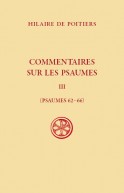SC 547 Ceux qui sont tombés
Collection Sources chrétiennes - N° 547
272 pages - août 2012
38,00€
Participer de près ou de loin à un sacrifice aux dieux païens est une faute qui exclut de l'Église. Mais que faire lorsque des dizaines, des centaines de chrétiens ont commis cette faute ? Sous l'empereur Dèce, en 250, on risquait la prison, l'exil, la confiscation des biens, la torture, la mort même, si l'on ne participait pas aux sacrifices publics exigés par l'empereur pour ressouder l'unité du monde romain. Beaucoup ont faibli, sont « tombés », ce sont les « lapsi ». Des rigoristes n'envisageaient aucune réconciliation pour ces « lapsi » ; des laxistes accueillaient les fautifs sans vraie repentance, surtout s'ils étaient porteurs de billets d'indulgence signés par des martyrs avant leur mort ou par des confesseurs de la foi. Entre les deux, Cyprien refuse d'interdire l'espoir, mais exige qu'on prenne conscience de la gravité de la faute commise et qu'on pratique une authentique pénitence, dans les larmes, la prière, le jeûne, l'aumône. Exhorter les fautifs pour qu'ils se plient à ces exigences, c'est les aimer vraiment et leur ouvrir l'espérance.
--
To take part in - or even be associated with – a sacrifice to a pagan god is a sin that excludes any subject from the Church. But what should be done when dozens, indeed hundreds of Christians have committed that sin? Under the emperor Trajan Decius, in 250, people risked prison, exile, the confiscation of their worldly goods, torture - even death – if they did not take part in public sacrifices ordered by the Emperor in his hope to reunite the Roman world. Many were weak and ‘succumbed’- they were the ‘lapsi’. Rigorists could not imagine any reconciliation for these ‘lapsi’; the more indulgent welcomed the sinners back without any real repentance, especially if they possessed written notes of indulgence given by a martyr before death, or by confessors of the faith. Between the two options, Cyprian refused to banish hope, but demanded that people become aware of the gravity of their sin and show authentic penitence, in tears, prayer, fasting and giving alms. To exhort sinners to accept his demands was truly to love them, and open up a way of hope.
--
To take part in - or even be associated with – a sacrifice to a pagan god is a sin that excludes any subject from the Church. But what should be done when dozens, indeed hundreds of Christians have committed that sin? Under the emperor Trajan Decius, in 250, people risked prison, exile, the confiscation of their worldly goods, torture - even death – if they did not take part in public sacrifices ordered by the Emperor in his hope to reunite the Roman world. Many were weak and ‘succumbed’- they were the ‘lapsi’. Rigorists could not imagine any reconciliation for these ‘lapsi’; the more indulgent welcomed the sinners back without any real repentance, especially if they possessed written notes of indulgence given by a martyr before death, or by confessors of the faith. Between the two options, Cyprian refused to banish hope, but demanded that people become aware of the gravity of their sin and show authentic penitence, in tears, prayer, fasting and giving alms. To exhort sinners to accept his demands was truly to love them, and open up a way of hope.
- Dimensions : 125x195x20
- ISBN : 9782204099158
- Poids : 320 grammes
Avec la collaboration de : Graeme Clarke, Maurice Bévenot, Michel Poirier
DU MÊME AUTEUR
> VOIR TOUS LES LIVRES DE l'AUTEUR











